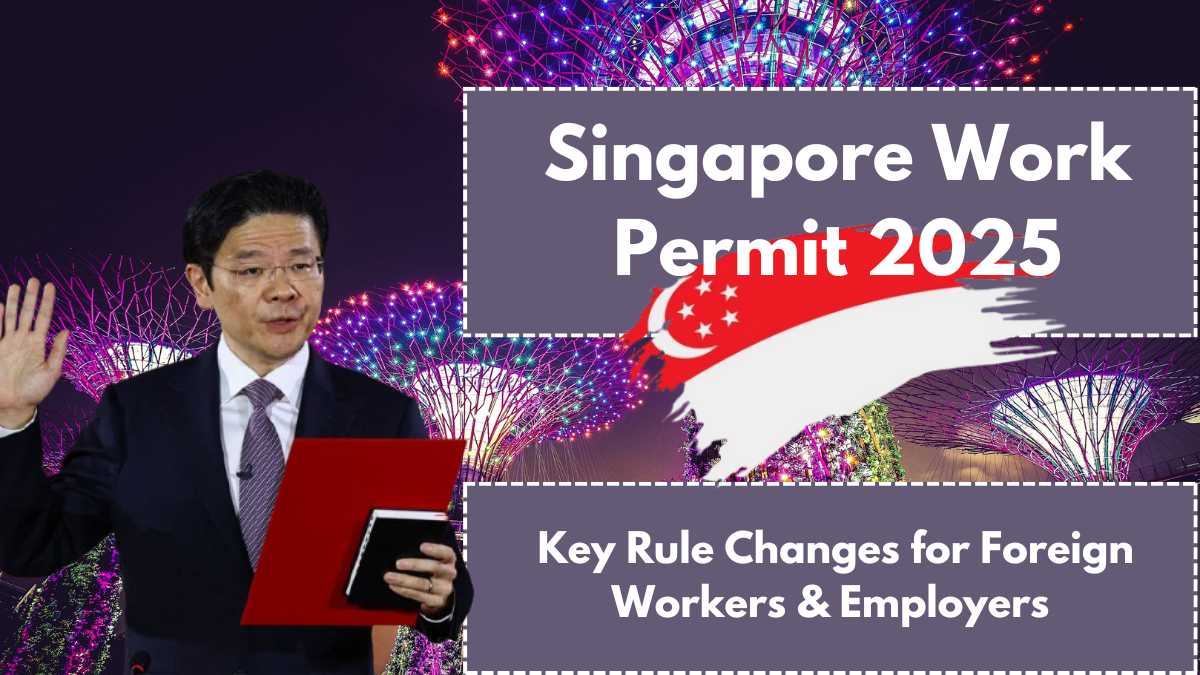Singapore is introducing significant changes to its work permit policies in 2025, impacting both employers and foreign professionals. These updates involve salary adjustments, stricter hiring regulations, and the implementation of the COMPASS framework for Employment Pass (EP) applications. The goal is to maintain a fair and competitive labor market while ensuring that foreign talent complements the local workforce.
The changes primarily target Employment Pass (EP) and S Pass holders, reinforcing the country’s commitment to workforce diversity, fair hiring practices, and economic sustainability. Below is a detailed breakdown of the upcoming modifications and their implications for businesses and workers.

Key Updates to Work Permit Regulations in 2025
| Update | Details |
|---|---|
| Employment Pass (EP) Salary Increase | Minimum salary raised to SGD 5,600 (from SGD 5,000), with financial sector salaries set at SGD 6,200. |
| S Pass Minimum Salary | Increased to SGD 3,300 (from SGD 3,150), with financial sector employees requiring SGD 3,800. |
| COMPASS Framework for EP Applications | A points-based evaluation considering salary competitiveness, education, diversity, and local hiring commitment. |
| S Pass Levy Rate Increase | Tier 1 levy raised to SGD 650 (previously SGD 550), while Tier 2 remains at SGD 650. |
| Workforce Fair Hiring & Compliance | Strengthened regulations to ensure local professionals receive priority in hiring processes. |
| EP & S Pass Renewal Deadlines | EP renewals must meet salary criteria by January 1, 2026, while S Pass holders have until September 1, 2026. |
1. Increased Salary Requirements for Employment Pass (EP)
Starting January 1, 2025, foreign professionals applying for an Employment Pass (EP) must meet new salary thresholds:
- Minimum monthly salary: SGD 5,600 (previously SGD 5,000).
- Financial sector professionals: SGD 6,200 per month.
- Higher salary requirements apply for older candidates (e.g., mid-40s applicants may need SGD 10,700).
- The new salary rules will apply to EP renewals from January 1, 2026.
This adjustment ensures that foreign professionals meet a competitive wage benchmark, aligning with salaries offered to local workers in similar roles.
2. Revised Salary and Levy for S Pass Holders
The S Pass, issued to mid-skilled foreign workers, will also undergo salary and levy adjustments:
- New minimum salary: SGD 3,300 (previously SGD 3,150).
- Financial sector employees: SGD 3,800 per month.
- Levy increase: Tier 1 levy raised from SGD 550 to SGD 650.
- Existing S Pass holders must comply with these new rules by September 1, 2026.
3. Implementation of the COMPASS Framework for EP Applicants
The Complementarity Assessment Framework (COMPASS) is a points-based system designed to assess EP applications fairly. To qualify, applicants must accumulate at least 40 points based on four key criteria:
- Salary Competitiveness – Higher salaries score more points.
- Educational Qualifications – Degrees from top universities receive more points.
- Company Workforce Diversity – Firms with a balanced mix of local and foreign employees are favored.
- Support for Local Hiring – Employers must demonstrate efforts to hire Singaporeans before recruiting foreign professionals.
This system aims to ensure that EP holders contribute positively to Singapore’s economy while complementing the local workforce.
4. Strengthened Fair Hiring and Compliance Measures
To promote local employment, Singapore is tightening hiring regulations under the Fair Consideration Framework (FCF). Employers must:
- Advertise job openings on MyCareersFuture for a stipulated period before hiring foreign workers.
- Prove recruitment efforts to hire local candidates before applying for work passes.
- Ensure transparent hiring practices to prevent nationality-based discrimination.
Failure to comply with these regulations may lead to penalties, such as delays in work pass approvals or placement on the Ministry of Manpower’s (MOM) watchlist.
5. Transition Periods and Renewal Deadlines
To ease the transition, Singapore has established renewal deadlines:
- EP holders must meet the new salary criteria by January 1, 2026.
- S Pass holders must comply with revised salary and levy conditions by September 1, 2026.
Employers should begin planning salary adjustments and workforce strategies to align with these upcoming changes.
FAQs on Singapore’s 2025 Work Permit Updates
1. How will the new salary requirements impact foreign workers?
Foreign professionals must meet the updated salary thresholds to qualify for an EP or S Pass. Those unable to meet the criteria may need to explore alternative work pass options or salary negotiations with employers.
2. What is the purpose of the COMPASS framework?
The COMPASS system ensures that EP applicants are evaluated based on salary, education, diversity, and local hiring commitment, fostering a balanced and competitive workforce.
3. Will these changes apply to existing work pass holders?
Yes, the new salary and levy requirements will apply to renewals as well—EP holders by January 1, 2026, and S Pass holders by September 1, 2026.
4. What are the consequences of non-compliance with hiring regulations?
Companies that fail to follow fair hiring practices may face penalties, including delays in work pass approvals and potential blacklisting by MOM.
5. How can employers prepare for these changes?
Employers should review salary structures, ensure compliance with hiring transparency, and familiarize themselves with the COMPASS framework to streamline work pass applications.
Singapore’s 2025 work permit changes reinforce its commitment to balancing local and foreign talent, ensuring economic growth while protecting job opportunities for Singaporeans. Employers and foreign professionals must stay informed and proactively adjust to these regulations to ensure seamless transitions and continued compliance.
For More Information Click Here
Akesh is a furniture expert with years of experience in design and craftsmanship. Specializing in sustainable materials, he shares his expertise to help people create stylish and functional living spaces.
